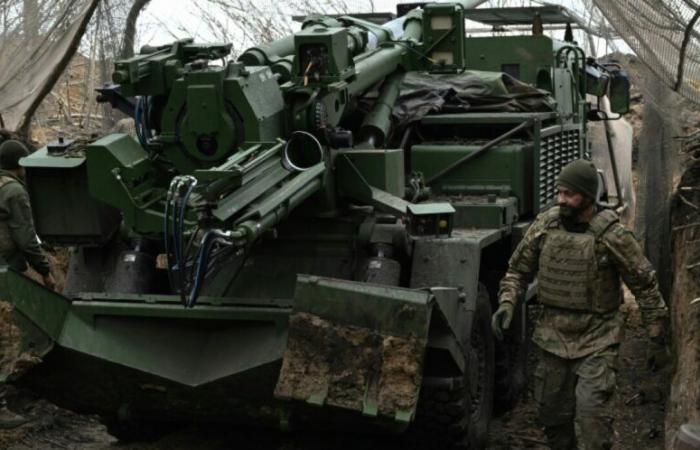
The men of this unit are in fact fighting against two enemies: the Russians but also the ills from which it suffers and which have their origins in the era of the USSR. Named in honor of a princess from kyiv who became queen of France in the Middle Ages and inaugurated with great fanfare by President Emmanuel Macron, the brigade was supposed to be the showcase of the military partnership between Ukraine and France. But it has been the subject of controversy since its recent return from France, where 2,300 of its 4,500 soldiers were trained.
A Ukrainian journalist, Yuri Boutoussov, increased the alerts, affirming in particular that 1,700 deserted, most of them even before their unit was deployed to the front, including 50 during their training in France. He also spoke of significant human losses and “organizational chaos” in the first days of his engagement in the Pokrovsk area, a key city on the Eastern Front. The brigade had very few drones, although essential, and part of its artillery was transferred to other units, as well as some of its soldiers to “plug the holes” in terms of manpower, said the journalist.
“Systemic” problems. These revelations had the effect of a bombshell at a time when the Ukrainian army is in a very difficult situation and has been retreating for months in the east before the more numerous and better armed Russian forces. They also raised questions about the usefulness of such projects, with Ukrainian President Volodymyr Zelensky having called on his Western allies to train and equip 14 brigades. Ukraine announced on Wednesday the arrest of a brigade unit commander for “leaving” his service and “inciting his men to do so”. She also organized a press visit to the brigade on Monday to try to put out the fire, while Paris recognized “a few dozen” desertions during training, deeming the phenomenon “marginal”.
In front of the press, including AFP, Taras Maksimov, the new brigade commander, appeared tense. “Everything that is said in the media is false,” assured the colonel, whose predecessor was fired in December. But a few hours later, his superior, the commander of the Ukrainian ground forces, Mykhaïlo Drapaty, well respected in the army, had a different tone. “I confirm of course that there were problems with the command and the training process,” the general admitted to several media, including AFP, but “perhaps not on the scale (… ) presented”.
“We are taking certain measures, particularly in terms of training and coordination, so that this military unit is truly ready to fulfill its missions,” he added. Such problems are “systemic for other brigades”, the officer further admitted. “It’s not a secret.”
Soviet heritage. Difficulties caused by vertical communication – particularly between field units, the general staff and the team of President Volodymyr Zelensky, the armed forces’ supreme commander, have persisted since the start three years ago of the Russian invasion of Ukraine. Civilian officials have complained about incomplete and late reports from the General Staff, questioning the work of generals trained when Ukraine was part of the Soviet Union. Sometimes, the presidency even directly verified information provided by the command with units. At the end of November, a very famous unit commander, Pavlo Palissa, a graduate of an American military school, was appointed deputy head of Mr. Zelensky’s cabinet, precisely to obtain first-hand information from the front.
Enemies on the battlefield, the Ukrainian and Russian armies share the same problem inherited from their Soviet past, analyzes Franz-Stefan Gady, an independent researcher attached to the International Institute for Strategic Studies (IISS). According to him, it is a “highly centralized command where decision-making power rests firmly and almost completely on high-ranking commanders, often far removed from the battlefield.” For Russia, the consequences of this situation are partially erased by a gargantuan reserve of men sent to their death.
-Change the mind. Ukraine has made efforts to combat this scourge in order to rise to NATO level since the annexation in 2014 of its Crimean peninsula by Russia followed by the outbreak of armed conflict with separatists led by Moscow . Although a new generation of officers has been able to be trained, the entire system has not been fundamentally changed and scandals of corruption and abuse of power by high-ranking officers regularly break out.
This Soviet mentality emanates mainly from higher command and “harms operational efficiency”, because rigidity and micro-management stifle “initiative” and lead to greater losses, notes Franz-Stefan Gady. Soldiers also mention the problem of untouchable commanders who place all blame on their subordinates. “The higher your rank, the less the laws apply to you,” sergeant and influencer Valery Markous recently described in a video.
It is not uncommon for soldiers to be “afraid” of their commanders, admits Mykhaïlo Drapaty. This “post-Soviet spirit must be eradicated,” he says. On the eastern front, the head of an artillery division made up of Caesar cannons, Serguiï Strakhov confirms to AFP that communication problems persist between soldiers on the ground and senior officers. But he believes that change has begun and that commanders applying the Soviet method “are fewer in number than before”.
Daria ANDRIIEVSKA
© Agence France-Presse





